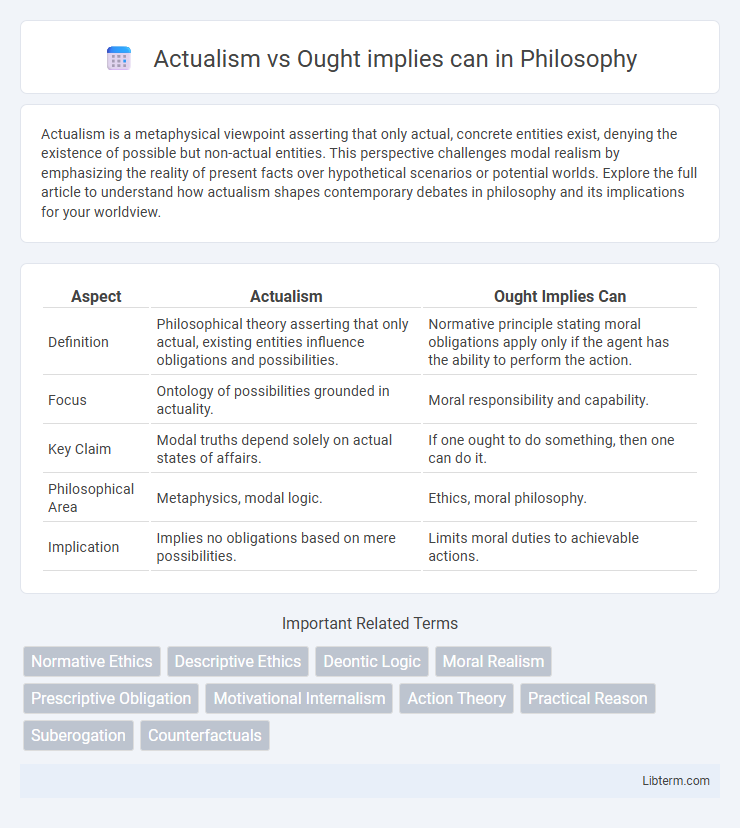Actualism is a metaphysical viewpoint asserting that only actual, concrete entities exist, denying the existence of possible but non-actual entities. This perspective challenges modal realism by emphasizing the reality of present facts over hypothetical scenarios or potential worlds. Explore the full article to understand how actualism shapes contemporary debates in philosophy and its implications for your worldview.
Table of Comparison
| Aspect | Actualism | Ought Implies Can |
|---|---|---|
| Definition | Philosophical theory asserting that only actual, existing entities influence obligations and possibilities. | Normative principle stating moral obligations apply only if the agent has the ability to perform the action. |
| Focus | Ontology of possibilities grounded in actuality. | Moral responsibility and capability. |
| Key Claim | Modal truths depend solely on actual states of affairs. | If one ought to do something, then one can do it. |
| Philosophical Area | Metaphysics, modal logic. | Ethics, moral philosophy. |
| Implication | Implies no obligations based on mere possibilities. | Limits moral duties to achievable actions. |
Understanding Actualism: A Philosophical Overview
Actualism in philosophy asserts that moral obligations depend on what agents can actually do in their circumstances, emphasizing the practical limits of action. This view contrasts with the principle "Ought implies can," which holds that moral duties presuppose the possibility of fulfillment. Understanding Actualism requires analyzing examples where an agent's inability shapes ethical responsibility, clarifying how moral evaluations consider real-world constraints.
The "Ought Implies Can" Principle Explained
The "Ought Implies Can" principle asserts that moral obligations depend on an individual's ability to perform the required action, emphasizing that one cannot be morally obligated to do something impossible. Actualism, in contrast, evaluates moral responsibility based on what an agent actually does rather than what they could have done in ideal circumstances. This principle plays a crucial role in ethical theory by linking moral duty to practical capability, ensuring obligations are meaningful and achievable.
Historical Roots of Actualism and Ought Implies Can
Actualism, rooted in early 20th-century analytic philosophy, challenges possibilism by asserting that only actual, not merely possible, actions matter in moral evaluation. The principle of Ought Implies Can, tracing back to Kantian ethics and further developed by philosophers like P.F. Strawson, insists that moral obligations presuppose the agent's capacity to fulfill them. Both concepts emerged from historical debates on moral responsibility, emphasizing the practical limits of human agency in ethical theory.
Key Differences Between Actualism and Ought Implies Can
Actualism holds that moral obligations depend on what agents can actually do, asserting that impossible actions cannot be morally required. Ought Implies Can specifically emphasizes that if someone ought to perform an action, it must be within their power to do so, linking moral duty directly to capability. The key difference lies in Actualism's broader metaphysical stance on possible worlds and moral obligations, whereas Ought Implies Can focuses narrowly on the logical relationship between moral obligation and an agent's abilities.
Moral Responsibility: Actualism vs. Ought Implies Can
Actualism in moral responsibility emphasizes that an agent's obligations are based on their actual abilities and circumstances at the time of action, rejecting idealized conditions. The principle "ought implies can" asserts that moral obligations are only binding if the agent is capable of fulfilling them, grounding responsibility in practical possibility. Disputes arise as actualism focuses on real-world constraints, while critics argue for ideal standards that may exceed actual capacities, affecting judgments of blame and accountability.
Analyses of Moral Dilemmas Under Both Theories
Analyses of moral dilemmas under Actualism emphasize actions based on actual outcomes and available future options, assessing moral responsibility through realized consequences. In contrast, Ought Implies Can theory posits that moral obligations are contingent on an agent's genuine ability to perform an action, restricting moral demands to feasible options. This theoretical divergence impacts the evaluation of dilemmas by prioritizing either factual causality in Actualism or normative capability constraints in Ought Implies Can frameworks.
Critiques and Challenges to Actualism
Critiques of Actualism often center on its reliance on the "Ought implies can" principle, questioning whether moral obligations genuinely require actual ability to perform an action. Philosophers argue that Actualism struggles to account for moral responsibilities when future abilities are uncertain or when agents face unpredictable constraints, challenging its practical applicability. This critique highlights a tension between normative ethics and realistic assessments of capability, suggesting that Actualism may inadequately capture the complexity of moral agency under conditions of uncertainty.
Debating "Ought Implies Can": Philosophical Objections
Debating the principle "Ought Implies Can" involves philosophical objections questioning whether moral obligation necessarily requires the ability to act. Critics argue that moral obligations may persist despite incapacities, challenging the idea that impossibility exempts one from duty. This debate highlights tensions between ethical theory, particularly in Actualism, which grounds obligations in actual ability, and alternative views that separate ought from can.
Practical Implications in Ethics and Law
Actualism in ethics and law asserts that moral responsibility depends on what agents would actually do, while the principle "Ought implies can" maintains that moral obligations apply only when actions are possible. This distinction influences legal accountability, as Actualism may excuse individuals unable to fulfill duties due to practical limitations, whereas "Ought implies can" focuses on feasible obligations. Practical implications include shaping judgments about blame, compliance, and policy-making in contexts where capacity constraints affect moral and legal expectations.
Actualism and "Ought Implies Can" in Contemporary Philosophy
Actualism in contemporary philosophy asserts that moral obligations are grounded in what agents can actually do, emphasizing the principle that "Ought Implies Can," which holds that a person is only morally required to perform actions within their genuine capacities. This stance challenges idealized notions of moral duty by insisting that normative claims must align with an agent's real-world abilities and limitations. Debates surrounding Actualism and "Ought Implies Can" revolve around reconciling moral responsibility with practical possibility, influencing discussions in ethics and moral psychology.
Actualism Infographic

 libterm.com
libterm.com